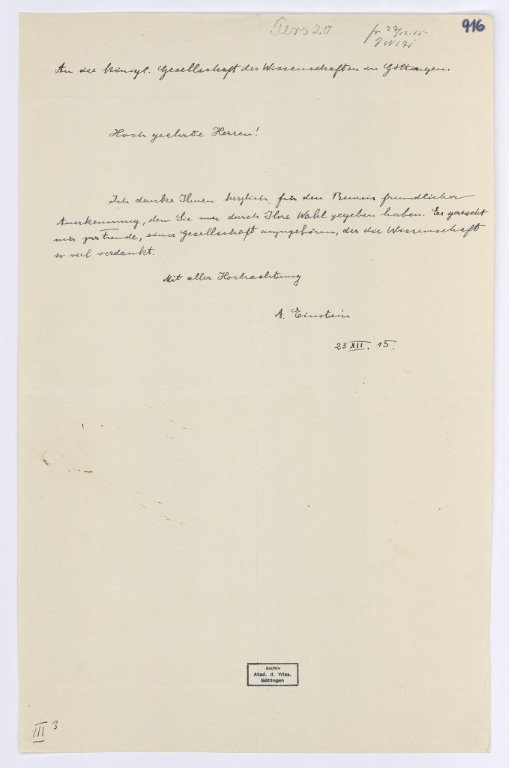“… Es gereicht mir zur Freude, einer Gesellschaft anzuhören, der die Wissenschaft so viel verdankt.”
“…It makes me happy to be a member of a society whom science has so much to thank for.“
Albert Einstein, Berlin 1915
EINSTEIN AND THE KÖNIGLICHE GESELLSCHAFT DER WISSENSCHAFTEN ZU GÖTTINGEN
(ROYAL SCIENTIFIC SOCIETY, GÖTTINGEN)
A short story of the (society) academy
In 1751 the Akademie der Wissenschaften zu Göttingen (Academy of Sciences, Göttingen) was founded by King George II of Great Britain, Elector of Hannover. In the seal of the today second oldest scientific academy in Germany, you can find the motto of the academy “Fecundat et ornat – it fertilises and adorns“. This motto refers to the relationship with the Georg August University in Göttingen, which was from the beginning very close. The first president of the academy was the Swiss doctor, natural scientist and author Albrecht von Haller (1708-1777) who realized his plan of “zweyerley Academien“ (two different academies). According to this plan the Georgia Augusta was responsible for the „Belehrung der Jugend“ (teaching of the youth) and the academy had the task to ”invent“. Thus the teachers of the Georgia Augusta could also become members of the Göttinger Akademie der Wissenschaften (Göttingen Academy of Sciences) and dedicate themselves to research.
The Göttinger Akademie (Göttingen Academy) looks back to a long tradition. Many famous scholars were members, among others Ernst Abbe, Max Born, Friedrich Christoph Dahlmann, James Franck, Carl Friedrich Gauß, Johann Matthias Gesner, the brothers Jacob and Wilhelm Grimm, Otto Hahn, Werner Heisenberg, David Hilbert, Christian Gottlob Heyne, Alexander von Humboldt, Georg Christoph Lichtenberg, Walther Nernst, Henri Poincaré, Julius Wellhausen, Adolf Windaus and Albert Einstein, to only name a few. Today the Göttinger Akademie der Wissenschaften (Göttingen Academy of Sciences) lists in its records more than ten Nobel Prize laureates.
Albert Einstein and the Königliche Gesellschaft der Wissenschaften zu Göttingen (Royal Scientific Society, Göttingen)
Albert Einstein was a corresponding member of the society from December 18, 1915 until his exclusion on November 3, 1933. He was proposed as corresponding member by the full members David Hilbert, Felix Klein, Carl David Runge, Woldemar Voigt and Emil Wiechert. He was elected in the meeting of December 18, 1915.
The directors of the academy, represented by the secretary Ernst Heinrich Ehlers, informed Einstein in writing that very same day. On December 20 Einstein wrote to one of the most important German mathematicians David Hilbert (1862-1943): „Ich danke Ihnen für die freundliche Mitteilung, die Wahl zum korr. Mitgliede betreffend.” (”I want to thank you for the friendly letter informing me about the election as corr. member.“)
Einstein officially thanked the society for the appointment in a letter dated December 23, 1915.
“An die königl. Gesellschaft der Wissenschaften in Göttingen.
Hoch geehrte Herren!
Ich danke Ihnen herzlich für den Beweis freundlicher Anerkennung, den Sie mir durch Ihre Wahl gegeben haben. Es gereicht mir zur Freude, einer Gesellschaft anzuhören, der die Wissenschaft so viel verdankt.
Mit aller Hochachtung
A. Einstein
23 XII. 15.”
“To the Royal Society of Sciences in Göttingen.
Dear Sirs!
I want to thank you very much for the proof of friendly recognition, which you gave to me through your decision. It makes me happy to be a member of a society whom science has so much to thank for.
With all respect
A. Einstein
23 XII. 15.”

After Einstein‘s withdrawal from the Bayerische Akademie der Wissenschaften (Bavarian Academy of Sciences) in June 1933 and the letter of the Auswärtiges Amt Berlin (Berlin Ministry of Foreign Affairs) to the Göttinger Akademie (Göttingen Academy) dated September 18, 1933 in which he is told that Einstein had „durch eigene Handlungen mehrfach dargetan, dass er keinen Wert darauf legt, deutschen wissenschaftlichen Vereinen oder Gesellschaften anzugehören“ (“through his own acts made clear several times that he does not value to be a member of German scientific institutions or societies“) Albert Einstein was, according to the decision of November 3, 1933, cancelled from the foreign members list.
In August 1945 and in December 1946 Einstein was once again offered the membership in the Göttinger Akademie (Göttingen Academy), however, both letters remained unanswered.
Today there are no further documents in the archive of the academy concerning Einstein and the Königliche Gesellschaft der Wissenschaften zu Göttingen (Royal Society of Sciences in Göttingen). There are also no publications of Einstein in the academy publications.
Note: The correspondence between the mathematician David Hilbert (Göttingen) and Einstein, which was handed over to the university’s library after Hilbert‘s death in 1943, attracted no interest and was returned to Princeton. The letters can be found today in the Einstein Archives in Jerusalem.
Illustrations credits:
Courtesy of the Archiv der Akademie der Wissenschaften zu Göttingen: Pers. 20., Blatt 916: 1
Bibliography:
| Editors: R. Schulmann, A. J. Kox, Michel Janssen, József Illy | The Collected Papers of Albert Einstein, Volume 8, Part A | Princeton 1998 |
| Abraham Pais | Ich vertraue auf Intuition – Der andere Albert Einstein | Heidelberg 1995 |


 DEUTSCH
DEUTSCH